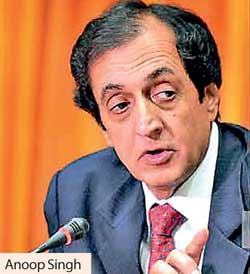Reply To:
Name - Reply Comment
As Sri Lanka is roughly a month away from presenting its budget for 2022, a former International Monetary Fund (IMF) official said it doesn’t have to be a crisis programme, instead it should focus on growth, with a medium-term path towards fiscal deficit reduction and debt sustainability, with provisions for taking care of the vulnerable sections of society.
 According to Anoop Singh, a former Director of the Asia Pacific Department of the IMF, while Sri Lanka is required to work on the state revenues, which stand among the lowest in international comparisons, extremely high budget deficit and unsustainably high debt level, the markets are well aware of the need for more spending in times of crisis brought about by the pandemic.
According to Anoop Singh, a former Director of the Asia Pacific Department of the IMF, while Sri Lanka is required to work on the state revenues, which stand among the lowest in international comparisons, extremely high budget deficit and unsustainably high debt level, the markets are well aware of the need for more spending in times of crisis brought about by the pandemic.
“Markets fully understand that in these COVID times, we need more spending,” Singh said in reference to the COVID containment-related spending and the spending required to support the economy to recover from the depths it fell, due to the pandemic-related economic restrictions, which left millions with destitute economic conditions.
The government is also confronted with the difficult choice between containing its budget deficit and need for providing support to the economic recovery, as the country is gradually coming out of the pandemic. Speaking at a recent webinar titled ‘Building Sri Lanka’s Fiscal Architecture’, organised by the Pathfinder Foundation, a policy advocacy institute in Colombo, Singh advocated for a growth-oriented budget, with clear signals to the international community on its medium-term fiscal and
debt targets. “I am not saying Sri Lanka needs a crisis programme. It needs a programme that is going to target where Sri Lanka will be in five and 10 years from now.”
“To do that, you need to work on your debt, work on your tax ratios, work on your revenues (while) understanding that all those things would not hurt those who need support,” Singh said.
Reminding that there are many Sri Lankans holdings leadership positions in almost all global institutions, including the IMF, Singh said they have better grips with what’s happening in Sri Lanka and therefore are better equipped than others to deal with its own problems much better.
“So, we don’t need to tell Sri Lanka what to do. You have people who know exactly what to do. The point is that the time has come to use them and do it,” said Singh, who is also a former Resident Representative of the IMF for Sri Lanka.
In the same vein however, he did not rule out the importance of the IMF’s role as an international referee, which according to him, has evolved enormously in prioritising the social needs of its member countries to receive the domestic acceptance for its programmes. “You would have seen in the past five years, under the recent Managing Directors of the IMF, the emphasis on social needs, social flexibility has been elevated,” Singh said. “The IMF has recognised that any programme needs to be inclusive in its nature, by which I mean as its first step is to make sure its social needs are met. Unless you do that domestically, unless it reaches the consensus domestically, the programme is not going to work,” he added. Singh also opined that the IMF of today would be willing to practice some patience until a country under a programme gets its fiscal targets up gradually, until which time the global lender would arrange with market access to funds to ride through that transition. Singh, who is also a former member of India’s 15th Finance Commission and Distinguished Fellow at the Centre for Social and Economic Progress (CSEP), however proposed Sri Lanka to have rules and establish the institutional architecture embedded into law to have durable fiscal sustainability. While Sri Lanka has some degree of institutional framework to provide fiscal oversight via parliamentary oversight committees such as the Committee on Public Enterprises (COPE) and Committee on Public Finance, they lack the expertise to serve their true purposes. Further, as a majority of these committees often comprise of the ruling party legislators, their true independence cannot also be guaranteed. Singh said Sri Lanka’s fiscal architecture suffers from the continuing lack of an independent and permanent agency and thus proposed to establish a ‘fiscal council’, “as a standalone fiscal body or as an independent body under Parliament, with powers to access records from the government”.